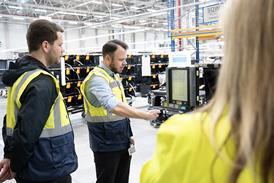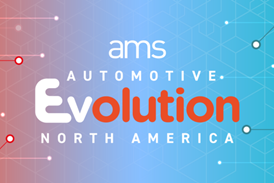
 Geico Taikisha executive vice-presidents Daryush Arabnia and Luciano Dinatale tell Dermot Healy about the company’s paintshop technologies work in China and its distinctive culture of innovation
Geico Taikisha executive vice-presidents Daryush Arabnia and Luciano Dinatale tell Dermot Healy about the company’s paintshop technologies work in China and its distinctive culture of innovation
AMS: Can you tell us a little about the history of Geico Taikisha’s involvement in the Chinese market. How did you get involved, and how has it changed over the years?
Daryush Arabnia (DA) and Luciano Dinatale (LD): It has gone through different phases. Back in the 1980s, Geico had involvement in China as a result of our work with Fiat, but we had no direct local presence. It was all done at a distance from our base in Italy. The real important changes in our relationship to the Chinese market occurred much more recently.
In 2010 we became involved in what was, for us, the strategically hugely significant Qoros Project. Here we had the opportunity to work with Chery and other partners to create a new, state-of-the-art, paintshop, using all the latest innovations that we were pioneering. With energy saving, water management, and sustainability high on the agenda, it was the kind of project that presented the ideal challenge for our company. It became almost a showcase for innovation, and a powerful example of the benefits that could be achieved using our high-tech solutions.
"Chinese OEMs want to be at the vanguard of technology to give themselves market advantage"
– Daryush Arabnia and Luciano Dinatale, Geiko Taikisha
Alongside this, the important alliance between Geico and the Japanese concern Taikisha, which emerged in 2011, was being consolidated at this time. It has enhanced our ability to further develop our work in both China and also other developing markets. We are confident the synergy between Geico and Taikisha offers significant opportunity for the future. Recent projects with PSA, Samsung Renault and Fiat GAC have all, for example, rested upon synergies generated by the Geico Taikisha alliance. And this alliance is already benefiting our Chinese customers.
AMS: So you have been devoting significant resources to supporting the Chinese market?
DA and LD: We have to be sensitive to the developments in the automotive industry in China to make sure that we can offer the customers the kind of service and support that they require at every phase of their development. Most recently, we have just brought together the R&D functions of both Geico and Taikisha in one major Advanced Innovation Centre in Tianjin. This was opened at the end of 2014 and will help us meet the ever-changing requirements of our customers. You must understand that the new Chinese OEMs do not just want workable solutions. They want to be at the vanguard of technology to give themselves market advantage. As a company that prides itself as a technology owner and technology innovator, rather than a simple supplier, we can offer the kind of support Chinese enterprises need. It is an exciting time for the industry. We have made the necessary investments in the area.
Also in Tianjin, we have a major manufacturing facility as well as important facilities in Beijing and Suzhou. There is also a representative office in Shanghai, so we are located in all the industrial centres of the country. The way we work with customers is, certainly in the early stages of a project, not just constrained by our own facilities or locations. Instead we seek to develop projects by coming together with our customers as partners in development, with our people almost operating as the customer technology departments, so we devote whatever resources and personnel are required.
AMS: You make reference to the attitude of the Chinese automotive sector to innovation and technology. Can you say a little more about this?
DA and LD: We work, as you know, with the major European OEMs and they are, of course, very demanding customers: constantly seeking new solutions and new ways of improving quality and controlling costs. But they have already massive investments and well-established ways of working and their own high level of expertise.

The established European and US manufacturers demand innovation, but they can still tend to be reluctant to be the first one to use a new system or a new solution, whereas the Chinese OEMs are maybe more flexible in their thinking. This presents an exciting opportunity for us, as we are a company with a culture of innovation and we have the ability to support their aspirations. We have, as we mentioned, adapted our organisation and presence in China to reflect our analysis of our customers’ requirements. It is our commitment to provide the support that they need.
AMS: You mention that Geico Taikisha is a company with a culture of innovation. How do you generate and sustain that culture?
DA and LD: Most companies would wish to be innovative, but innovation can be difficult to sustain. It is difficult but we think maintaining a culture of innovation is essential if we are to do good business in China, and of course elsewhere. Our company has given great attention to this. There are practical steps that we have taken which have helped, so we regard our people – at whatever level – as the key to innovation. We create opportunities for everyone to contribute ideas and have organisational structures that allow people access to information that, in turn, allows them to think outside their immediate remit.
To take a concrete example: we recruit the best of bright young engineering graduates from across the various engineering and scientific disciplines. We take care to offer them carefully structured regular opportunities to develop and present new ideas. Senior management hear their proposals directly at regular meetings, so ideas – whether workable or not – are encouraged and not stifled. So also with the facilities we offer our people. In Milan, of course, we have our recreation centre. This embodies our philosophy of encouraging people to think beyond what they do at present, to think beyond rigid disciplinary boundaries and to make the kind of connections that are necessary for innovation and creativity. This same spirit will hopefully animate our new R&D centre in Tianjin.
We feel especially in hard times that companies must invest in innovation, and successful innovation requires freedom and flexibility of thought. New paint ovens, new conveyor and positioning systems may seem very mundane and practical products but they can only be produced successfully by people with real confidence and creativity.
AMS: What of the products you produce and the technologies you are developing – can you tell us something about recent developments?
DA and LD: In China, and indeed worldwide, the issues of energy consumption, emissions and sustainability have become of key importance to the sector. Many of our most exciting recent developments have been focused on the key target to reduce the adverse impact of manufacturing. Energy consumption in paintshops has been cut dramatically in recent years. Improved conveyor and positioning systems, advanced oven construction, catalytic heating panels and a range of other advances have all played their part to reduce energy requirements.
Every bit as important has been our ability to help customers manage their water usage. In China, as in many of the developing markets, water remains a major issue and with our Dryspin technologies and other advances we have been able to make a major impact on water usage with any residues managed in a way that prevents polluted liquid material leaving the facilities where we have an involvement.
AMS: From what you say, it would seem Geico Taikisha is confident about its role in the future development of the Chinese automotive sector.
DA and LD: We believe we have a secure and growing contribution to make to Chinese automotive manufacturing. Obviously, the economy has been subject to cyclical growth and retraction in recent years, but our distinctive way of working and commitment to high-quality technical innovation aids our competitiveness and gives us a degree of security. Moreover, the alliance between Geico and Taikisha is increasingly allowing us to exploit new synergies to the benefit of our customers in all the developing markets.






























